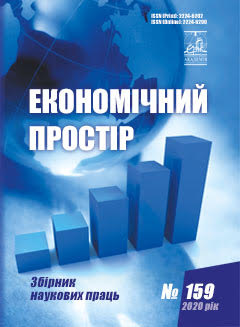STRATEGIC PRIORITIES FOR REFORMING THE INTERNATIONAL MONETARY FUND AS A FUNCTIONAL INSTITUTE OF INTERNATIONAL FINANCIAL RELATIONS
Abstract
The article is devoted to the functioning of the International Monetary Fund in the status of an international financial cooperative, which forms its credit capital through official borrowings from member countries and the issuance of promissory notes on a bilateral basis. One of the effective tools for providing financial assistance to the IMF to overcome the effects of the global economic crisis was the organization's focus on providing member countries with stand-by loans and extended financing loans. The urgent need for the International Monetary Fund to make greater progress in building an integrated and objective system of supervisory control over the functioning of the global financial system led to the expansion of the IMF's functional competencies for regular monitoring of cross-border movement of capital resources. capital movements, diagnostics of the processes of accumulation of global foreign exchange reserves and their country structure, as well as the development and implementation in regulatory practice of a reliable and objective system of global liquidity ratios, taking into account the systemic impact of global financial instability. Reforming the International Monetary Fund in the format of building a global model of the international economic order should also include the implementation of a set of measures to ensure macroeconomic stability in the world. Special attention should be paid to such areas of reforming the International Monetary Fund as strengthening the openness of its internal paperwork and significantly simplifying the bureaucratic procedures for obtaining credit resources by states. The reform of the IMF in the context of the formation of a global model of the international financial order provides as a mandatory component and redistribution of spheres of influence of member countries within the organization in accordance with their competitive status in world finance and contribution to global economic development. It is about the objective need to strengthen the competitive position for the adoption by the International Monetary Fund of management decisions of developing countries and countries with emerging markets.
References
Столярчук Я.М. Глобальні асиметрії економічного розвитку : монографія. Київ : КНЕУ, 2009. 276 с.
Ковбаса В.А. Сучасні тенденції та перспективні напрями реформування Міжнародного валютного фонду. Інвестиції: практика та досвід. 2017. № 22. С. 53–56.
The IMF at a Glance. Facksheet, 22 March 2019. IMF. URL: https://www.imf.org/en/About/Factsheets/IMF-at-a-Glance (дата звернення: 13.08.2020).
Действия МВФ в ответ на глобальный экономический кризис. Информационная справка МВФ. 2016. URL: www.imf.org/external/np/exr/facts/rus/changingr.pdf (дата звернення: 13.08.2020).
Cannes Summit Final Declaration «Building Our Common Future: renewed collective action for the benefit of all». URL: http://www.g20.utoronto.ca/2011/2011-cannes-declaration-111104-en.html (дата звернення: 13.08.2020).
Шаров О. Наступний Бреттон-Вудс: логіка розвитку міжнародної валютної системи. Вісник Національного банку України. 2014. С. № 8. С. 19–25.
Krueger A. A New Approach To Sovereign Debt Restructuring. IMF, 2002.
Фінансова глобалізація і євроінтеграція / за ред. О.Г. Білоруса, Т.І. Єфименко ; ДННУ «Акад. фін. управління». Київ, 2015. 496 с.
Медведкіна Є.О. Трансформація світової фінансової системи у глобальному вимірі: монографія. Донецьк : ДонНУ, 2013. 221 с.
Stoliarchuk Ya. (2009) Hlobalni asymetrii ekonomichnoho rozvytku: monohrafiia [Global asymmetries of economic development: monograph] Kyiv: KNEU. (in Ukrainian)
Kovbasa V. (2017) Suchasni tendentsii ta perspektyvni napriamy reformuvannia Mizhnarodnoho valiutnoho fondu [Current trends and prospects for reforming the International Monetary Fund]. Investments: practice and experience. No 22. P. 53-56.
The IMF at a Glance. Facksheet, 22 March 2019. IMF. URL: https://www.imf.org/en/About/Factsheets/IMF-at-a-Glance (access date: 13 August 2020)
Deistvyia MVF v otvet na hlobalnii ekonomycheskyi kryzys. Ynformatsyonnaia spravka MVF, 2016. URL: www.imf.org/external/np/exr/facts/rus/changingr.pdf (access date: 13 August 2020)
Cannes Summit Final Declaration «Building Our Common Future: renewed collective action for the benefit of all». URL: http://www.g20.utoronto.ca/2011/2011-cannes-declaration-111104-en.html (access date: 13 August 2020)
Sharov O. (2014) Nastupnyi Bretton-Vuds: lohika rozvytku mizhnarodnoi valiutnoi systemy [Next Bretton Woods: the logic of the international monetary system]. Bulletin of the National Bank of Ukraine, August 2014, P. 19 -25.
Krueger A. (2002) A New Approach To Sovereign Debt Restructuring. IMF.
Finansova hlobalizatsiia i yevrointehratsiia / za red. O.H. Bilorusa, T.I. Yefymenko [Financial globalization and European integration] (2015). Kyiv: DNNU «Akad. fin. upravlinnia». (in Ukrainian)
Medvedkina Ye. (2013) Transformatsiia svitovoi finansovoi systemy u hlobalnomu vymiri: monohrafiia [Transformation of the world financial system in the global dimension: a monograph]. Donetsk: DonNU. (in Ukrainian)



